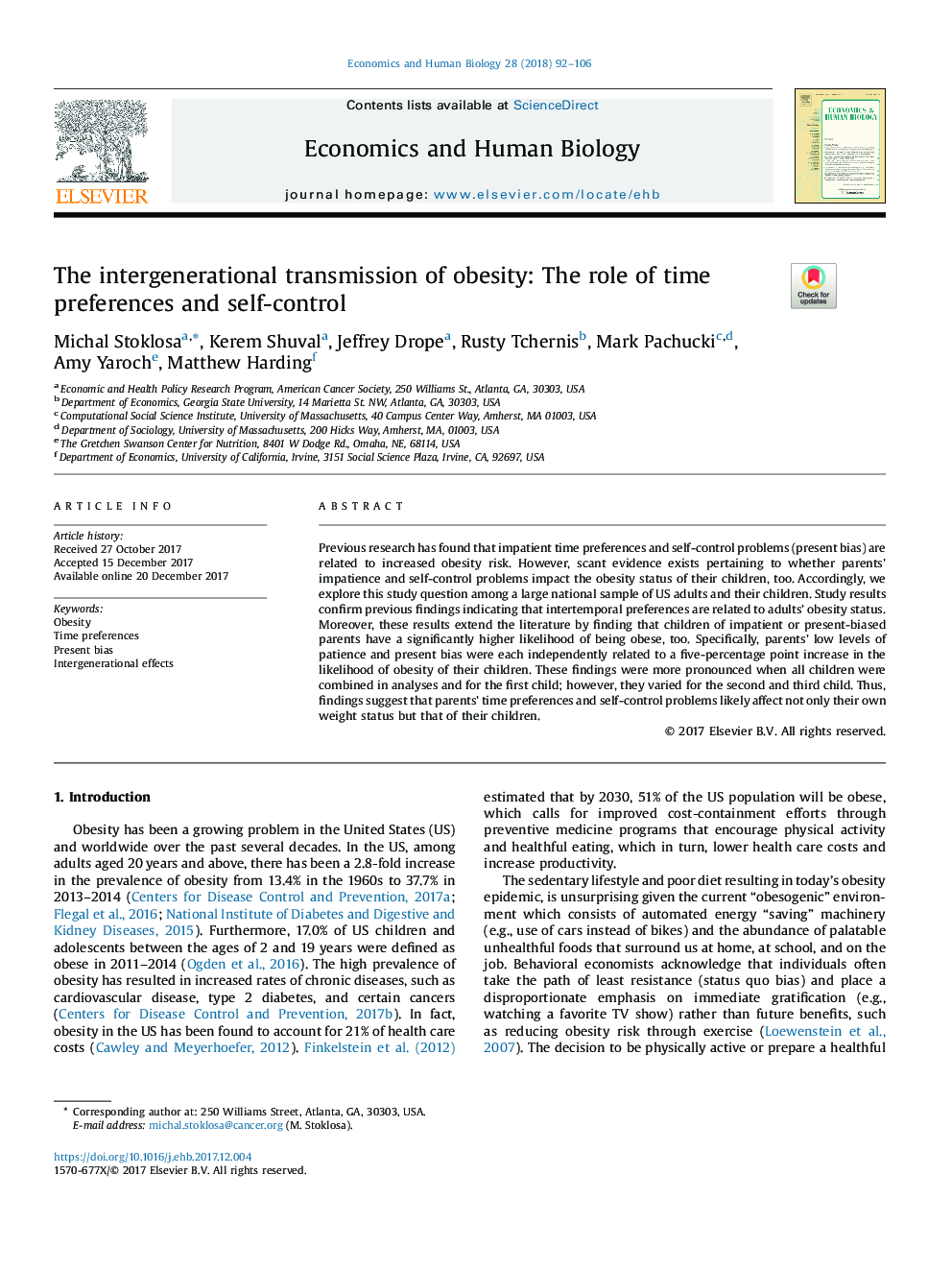| کد مقاله | کد نشریه | سال انتشار | مقاله انگلیسی | نسخه تمام متن |
|---|---|---|---|---|
| 7348283 | 1476550 | 2018 | 15 صفحه PDF | دانلود رایگان |
عنوان انگلیسی مقاله ISI
The intergenerational transmission of obesity: The role of time preferences and self-control
ترجمه فارسی عنوان
انتقال بین نسلی چاقی: نقش تنظیم زمان و کنترل خود
دانلود مقاله + سفارش ترجمه
دانلود مقاله ISI انگلیسی
رایگان برای ایرانیان
کلمات کلیدی
چاقی، ترجیحات زمان، تعصب فعلی، اثرات بین نسلی،
ترجمه چکیده
تحقیقات پیشین نشان داده است که ترجیحات زمان های بی وقفه و مشکلات کنترل خود (جبری) با افزایش خطر ابتلا به چاقی همراه است. با این حال، شواهد بی شماری در مورد اینکه آیا مشکلات والدین بی صبری و خود کنترل بر وضعیت چاقی کودکان خود تاثیر می گذارد وجود دارد. بر این اساس، ما این سوال مطالعه را در میان یک نمونه بزرگ ملی بزرگسالان ایالات متحده و کودکان آنها مورد بررسی قرار می دهیم. نتایج مطالعه نشان می دهد که یافته های قبلی نشان می دهد که ترجیحات بین دوره ای مربوط به وضعیت چاقی بزرگسالان است. علاوه بر این، این نتایج ادبیات را گسترش می یابند و این نشان می دهد که بچه های والدین بی تجربه یا والدین دارای حالات جسمی دارای احتمال بالاتری از چاقی نیز هستند. به طور خاص، سطوح پایین صبر والدین و تعصب در حال حاضر هر یک به طور مستقل به افزایش پنج درصد افزایش احتمال ابتلا به چاقی کودکان مربوط می شود. این یافته ها هنگامی که همه کودکان در تجزیه و تحلیل و برای اولین بار ترکیب شدند، بیشتر مشخص شد. با این حال، آنها برای کودک دوم و سوم متفاوت بود. بنابراین، یافته های نشان می دهد که تنظیمات زمان والدین و مشکلات خود کنترل احتمالا نه تنها بر وزن خودشان، بلکه بر فرزندانشان تأثیر می گذارد.
موضوعات مرتبط
علوم زیستی و بیوفناوری
علوم کشاورزی و بیولوژیک
علوم کشاورزی و بیولوژیک (عمومی)
چکیده انگلیسی
Previous research has found that impatient time preferences and self-control problems (present bias) are related to increased obesity risk. However, scant evidence exists pertaining to whether parents' impatience and self-control problems impact the obesity status of their children, too. Accordingly, we explore this study question among a large national sample of US adults and their children. Study results confirm previous findings indicating that intertemporal preferences are related to adults' obesity status. Moreover, these results extend the literature by finding that children of impatient or present-biased parents have a significantly higher likelihood of being obese, too. Specifically, parents' low levels of patience and present bias were each independently related to a five-percentage point increase in the likelihood of obesity of their children. These findings were more pronounced when all children were combined in analyses and for the first child; however, they varied for the second and third child. Thus, findings suggest that parents' time preferences and self-control problems likely affect not only their own weight status but that of their children.
ناشر
Database: Elsevier - ScienceDirect (ساینس دایرکت)
Journal: Economics & Human Biology - Volume 28, February 2018, Pages 92-106
Journal: Economics & Human Biology - Volume 28, February 2018, Pages 92-106
نویسندگان
Michal Stoklosa, Kerem Shuval, Jeffrey Drope, Rusty Tchernis, Mark Pachucki, Amy Yaroch, Matthew Harding,
